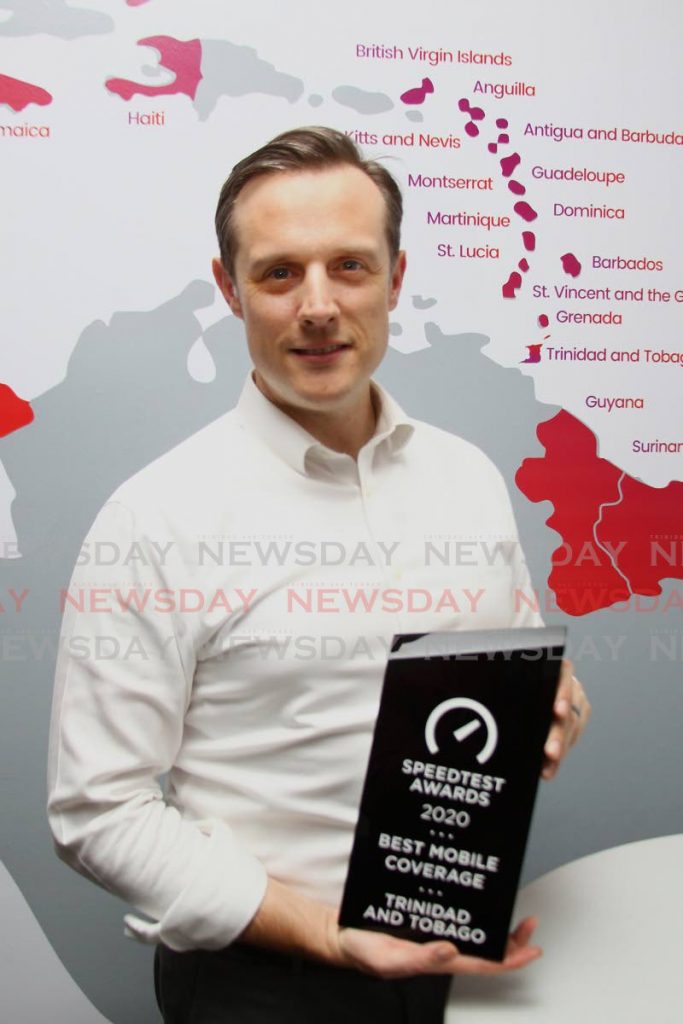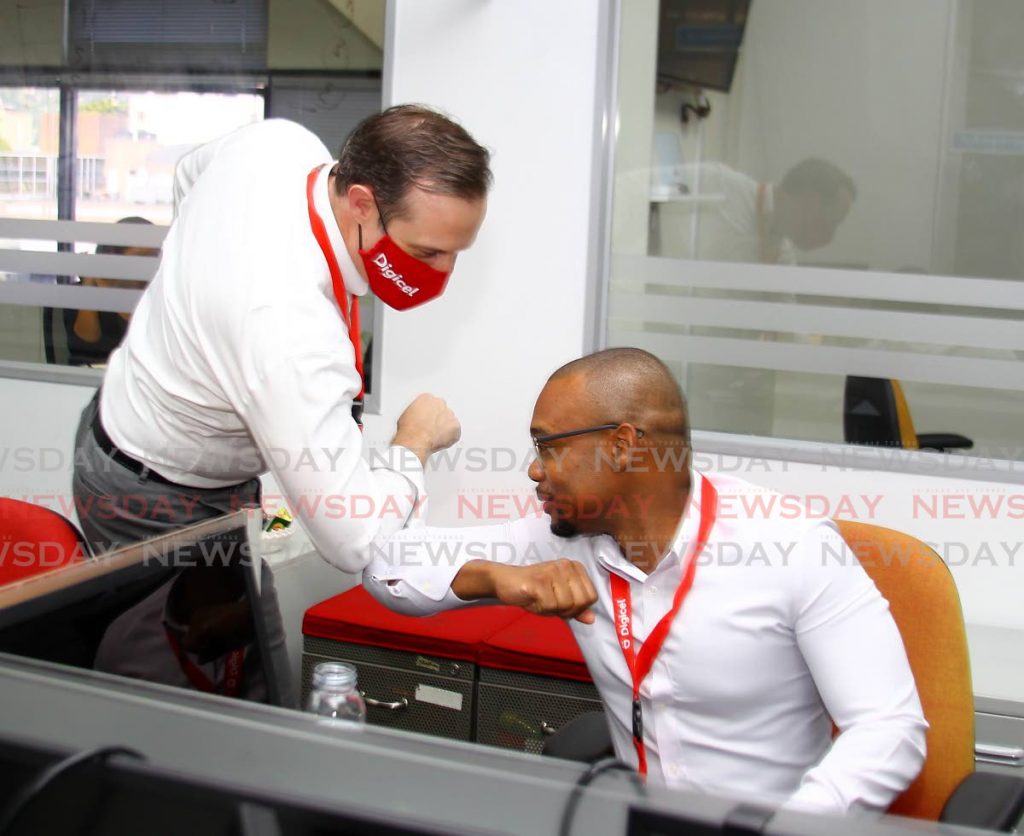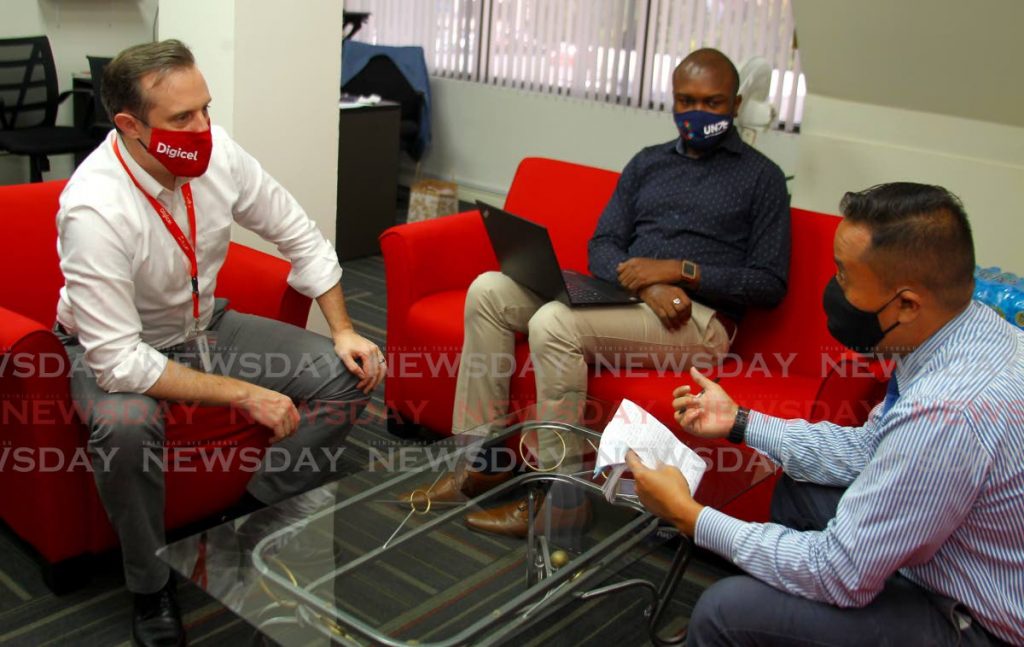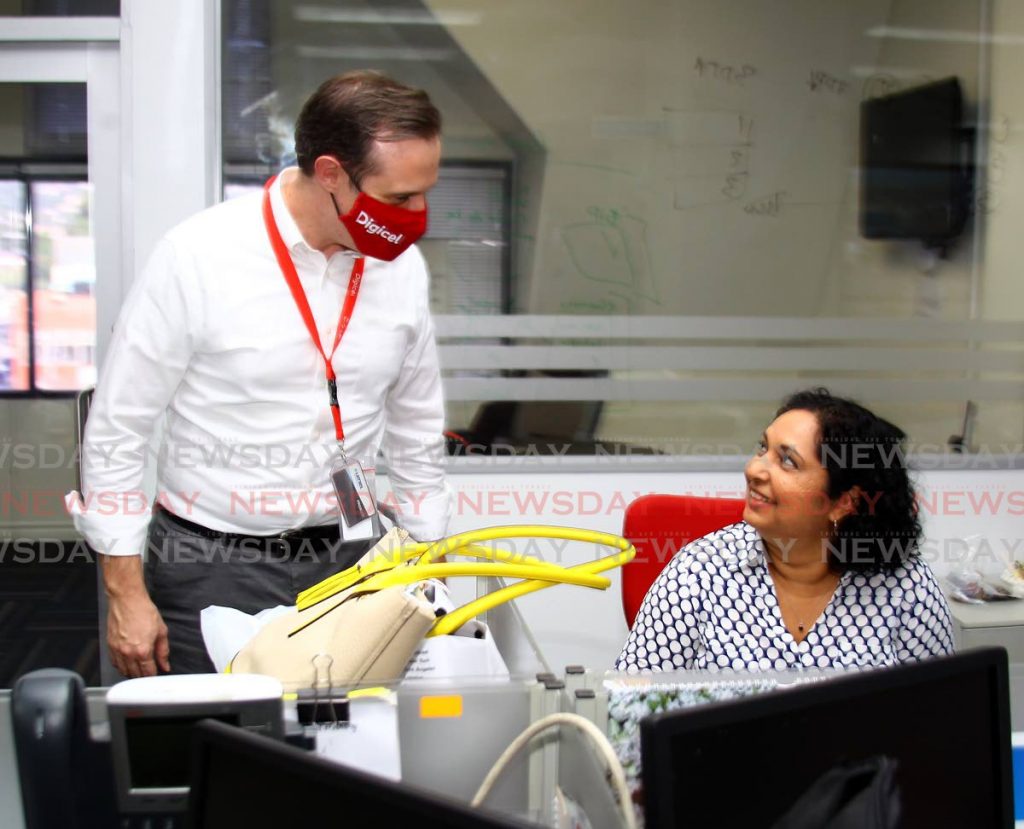Digicel TT keeps focus on consumer service

For Digicel TT’s newly appointed CEO Abraham Smith, the importance of telecommunications has special significance as it keeps him close to his family every day.
The 42-year-old Oklahoma native has lived most of his life outside the US since 1998 and has a special appreciation for the importance of quality broadband service that has helped millions of families like his stay in touch half a world away.
Smith, who was announced as the Digicel TT’s CEO on Monday is a relatively new addition to the staff, having joined the company in 2019. (His predecessor, Jabbor Kayumov, has moved on to a new role at the company's headquarters in Jamaica.)
Speaking with Business Day at Digicel’s Maraval Road offices in Port of Spain, on Tuesday, Smith said in contrast to his current, tech-savvy lifestyle, his childhood was spent on a quaint sheep farm in Oklahoma, but his sense of adventure and need to see the world was what introduced him to telecommunications.

“While I was in Russia working, I saw a world in change. It really showed me how economics affects the lives of people.
“I saw the devaluation of the currency in Russia and because of bad policy, bad business practice, people’s lives were ruined and I realised there was a huge responsibility to people.”
His start in the telecommunications business officially began in 2000 working with UCell, a Uzbekistan-based service provider across Eastern Europe and the Middle East.
During the early 2000s, Smith witnessed firsthand the speedy evolution of telecommunications technology from bulky palm pilots to sleek smart phones and tablets.
But even with this rapid technological leap, Smith realised without a proper understanding of employees’ challenges and customer needs, success would be limited.
“I love this business. I love the idea of people working together to accomplish really big things. When I was working in Uzbekistan I realised the telecom business isn’t radio waves and wires. It's connecting people with other people, ideas and things they love and need. It may sound cheesy but it became my higher purpose.”
At a relatively young age, Smith was appointed the CEO of UCell, where he sharpened his skills as a leader while learning the essentials of management and how to help his staff realise their full potential.
“I clearly wasn’t around as long as some of the other guys who worked there and I realised I won’t impress anyone with how smart I am but I can make a difference if I help them accomplish what they want to do. My life, stock and trade became helping them frame their story, organising what they wanted to get done and that framed up how I led.”
Smith’s first introduction to Digicel came in 2007 while working in Uzbekistan, as a chance remark from his wife who suggested he find a company to work for on an island. A cursory search on the internet would lead him to a small but growing mobile service provider in the Caribbean, that piqued his interest.
“I Googled ‘cellphone company on an island’ and I wish you saw my face sitting in my desk and seeing news stories pop up of Digicel in the Caribbean. This was at the time Digicel was opening up in countries and I saw article after article of red umbrellas, bags, walls, banners and in every article, it became clear these guys were here to change the way things were done.”

It would not be for another 12 years that Smith was invited to TT by Kayumov, for a job as consumer director. Here he said he was impressed with the work ethic of his staff, who went the extra mile to ensure customer satisfaction. “I saw really sharp people here. I was impressed with how well the company was run and how hard everybody worked. If there was a customer who can’t get connectivity in the back corner of their house or under their bed, our chief technical officer wants to know about it. We’re here to serve customers and if you’re not doing that then you’re not helpful.”
In the months that followed, Smith would be given the opportunity to serve customers in more ways than before with the Digicel group’s rebranding from mobile service provider to digital operator.
The company officially launched its rebrand last month. For customers, this expansion means a wider range of services are available to keep up with the demands of their lives.
“Customers’ lives have changed. Voice and data are no longer what the customer is asking for, so we have to change to deliver value to you. As people’s lives are becoming digital, using apps, getting entertainment online we have to be there for our customers in those moments or why are we here at all?
“Being a digital operator means coming out with a set of services like D Music to listen to music. We partnered with a messaging app call Bip that we’ve integrated with our network to do messaging with your friends.”
According to a 2018 report from the UK’s Office of Communications (Ofcom), British people check their phones every 12 minutes. With 1,440 minutes in a day, Smith wants to ensure that Digicel’s services are literally at the customer’s fingertips any time of the day at work or at play.
While providing quality service is one hurdle, the challenge of bringing a nation of people and services online is another. Last month during the 2021 budget Finance Minister Colm Imbert said the digitisation of TT would be a top priority, a need further highlighted by the impact of the covid19 pandemic. So how far does TT have to go to attain full digitisation?
According to Smith, the infrastructure and willingness of all stakeholders are already in place.
“I think the government in general was extremely aware of the needs that both people and operators had at the time (of covid19) so we could more effectively provide service in that shifting time.

“They made additional frequency spectrums available so we could deliver more service. They also allocated several different types of funds for folks who previously couldn’t afford to be in this digital world. The concepts and ideas have been out there for years so it’s just a matter of putting action to it and I see some of these (happening).”
Smith said in addition to government’s commitment to digitisation, he was also impressed with the willingness of small local businesses and the public to being part of the digital transformation.
“I’ve been blown away when I think about all the digital innovation that has happened in the past six months on the small business level and it’s really for a government and the infrastructure providers to keep up with them and support their pace of change.”
To better promote the full digitisation of TT, Smith said Digicel has been active in various initiatives to make online learning accessible and affordable to children through cost-effective service and devices.
With the inevitable increase in use of online tools for entertainment, business and education, Smith said Digicel has risen to the challenge and continues to provide quality service to all customers despite the increase in usage.
“We’re doing really well with bandwidth. Our technical teams have done a really great job with adjusting the capacities to fit the new traffic patterns of people. We have additional frequencies that we recently were allocated that is helping us expand connectivity in the more rural areas. There was a massive increase in usage and what that meant is we had to be on top of moving capacity from business centres to residential centres.”
As the virus changes certain aspects of Digicel’s operations, there are some things that remain the same even in the midst of a pandemic – namely, market competition.
While TT is home to only two major telecommunication brands, Smith acknowledges the competition for customers on a small island can be stiff but sees competitors not only as opposing companies but different digital platforms.
“When was the last time you made an actual phone call, compared to WhatsApp, Facebook Messenger or other voice calls you’ve made? We have huge competition across all of our services from people across the world and that is our biggest challenge.
“If you think about the television network, there is huge competition for content today because customers can acquire content from across the world through multiple types of delivery channels and I think that’s the real challenge for us as an industry – how to navigate those challenges.”
While the development of newer and more innovative apps is inevitable, he realises Digicel’s key to winning new customers is not only through the quality of products they provide, but also through their customer service.
Smith, ever since he was hired as consumer director, has remained true to his friendly, customer-oriented approach to doing business as CEO and insists that just as important as new technology, good service and dedicated staff are needed for success.
His appointment comes at a time of challenge and opportunity, as he is tasked with steering a new and improved Digicel through the financial uncertainty left behind by a global pandemic. Now more than ever, Smith hopes to bring people closer together even if they are further apart.

Comments
"Digicel TT keeps focus on consumer service"